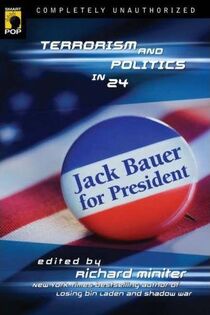| Jack Bauer for President: Terrorism and Politics in 24 | |
|---|---|

| |
| Written by: | Richard Miniter |
| Pages: | 200 |
| Publisher: | BenBella Books |
| Pub. date: | March 1, 2008 |
| ISBN number: | 978-1933771274 |
Jack Bauer for President: Terrorism and Politics in 24 is a 24 reference book released March 1, 2008. It is a collection of essays about the themes and issues of 24.
Summary[]
Official description[]
"This collection of essays sheds some light on the underlying issues in 24, one of the most gripping, dramatic, and addictive shows on television. With contributors drawn from fields including philosophy, psychology, political science, and counterterrorism, the essays reflect, distort, and comment on our modern political landscape. Using our current political climate to enrich viewers’ experience of 24, this book addresses how much of the show is realistic and what it has to say about modern politics and foreign policy in America’s fight against terrorism. Essays look at issues including the show’s images of terrorism, the ethics and effectiveness of the characters’ counterterrorism practices, the portrayal of government and politics on the show, whether it takes a terrorist to fight a terrorist, how much “the people” have a right to know in life-threatening circumstances, and how effective we really want our heroes to be."
Description[]
Above all else, 24 seems to be a sociopolitical commentary, reflecting America in the days after 9/11. The character of Jack Bauer, portrayed by actor Kiefer Sutherland, is widely regarded as a modern day hero for many viewers. Why is Jack Bauer so popular? Why are both liberals and conservatives (fans include President Bush and former President Clinton) equally interested in the show? These questions and more are reflected upon in Jack Bauer for President: Terrorism and Politics in 24 (BenBella Books, April 2008) edited by The New York Times bestselling author and internationally recognized terrorism expert Richard Miniter. Through 24 essays from experts in fields such as philosophy, psychology, political science, counterterrorism and law, Jack Bauer for President examines how 24 twists, mirrors and comments upon the current political landscape. As various essays reveal, 24 appeals to such a diverse audience because viewers are forced to analyze serious matters such as current threats to America's national security.
The book features thirteen essays on 24 and its relation to the real life world of terrorism, as well as the people who work to stop it. It looks into ways that 24 depicts or distorts reality in terms of the ways that real-life counter-terrorist agents work.
Living with Terror
- Jeanne Cavelos discusses the effect of 24 on America in terms of it occuring soon after the attack on the World Trade Center in New York.
Can a Leftist Love 24?
- A discussion by Stephen Rubio regarding whether Liberals can find the concept of 24 to be appealing despite the nature of the show.
"I Despise You for Making Me Do This"
- Brett Chandler Patterson's look into whether Jack Bauer's use of extreme interrogation methods is worthwhile for the results; do the ends justify the means?
Honey Traps, Romeos and Blackmail
- Paul Lytle talks about the use of sex and love by some characters to blackmail others in 24.
Hacking Jack Bauer
- Jim Rapoza does quite literally what it says on the tin and talks about the use of computer hacking in the show.
Jack Bauer is the Dirty Harry for the Age of Terrorism
- Lorie Byrd contrasts the modern-day hero Jack Bauer to the veteran good-guy Dirty Harry, even including some quotes to back up her points.
Simulating Terror
- Aaron Thomas Nelson considers why the critics of Former President George Bush love 24 despite its supposed support of Bush ideals.
The Third Degree
- Christopher L. and Deborah J. Patrick try to uncover the truth about 24 in terms of the brutal use of torture.
24 and the Use of Torture to Obtain Preventative Intelligence
- Alan M. Dershowitz does not disappoint viewers of his title and delivers an essay about the use of torture to gain preventative intelligence.
The Reality of Terrorism
- Eli Lake discusses the differences between the torture that is seen on the show and real-life torture that is used.
Jack (Bauer) and the Beanstalk
- Daveed Gartenstein-Ross and Kyle Dabruzzi talk about the power of imagination in understanding the mind of a terrorist.
Hail to the Chief
- Kristine Kathryn Rusch considers the politics of the show and how they relate to real life.
Jack Bauer Syndrome
- The final essay shows Eric Greene talking about the impact Jack Bauer has had on America's political climate.
